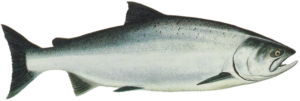By Jack Whitney
Normally this is called the elephant in the room, but since we are fishermen I thought we could relate to a fishing metaphor better by using a grown chinook salmon. I may be off on that comparison. Has anyone seen a 50-pound chinook caught in the northwest recently?
The 50-gallon fish tank represents all the conservation efforts to save fish, salmon, wildlife, polar bears, humans, etc. The chinook (or elephant) is global warming. We are basically ignoring the long-term effects of global warming and are just giving lip service to it. I have read about studies on how to protect different species of trout and salmon from global warming, but underneath these studies, there is an assumption that at some point we will stop the heating of the planet.

The major contributor to greenhouse gases is power generation. In 2016. 66% of our power was produced by hydrocarbons which are the major contributor to global warming. Nuclear provided 11% of our power and sustainable sources such as wind, solar and hydropower contributed 22%. To keep the world within the 2oC warming target by 2050, we would have to change that mixture to 22% hydrocarbons, 17% nuclear, 57% sustainable, and another 4% in unspecified production. On top of all this, the International Energy Agency (IEA) forecasts that the demand for energy could double by mid-century from population growth and the rise in standards of living in the third world.
What are the consequences if we don’t meet the 20C goal? As most of us are aware our arctic ice is melting. Once it gets warm enough to melt the permafrost—which releases more CO2 –the green-house gases in our environment will race out of control. Scientists estimate the potential release of green-house gases from permafrost could be twice what we are now contributing to our atmosphere. That suggests, the amount of CO2 we are now contributing could eventually doom us. But if we have the will, we can control those emissions and control temperature increases.
So how are we doing in meeting that 2oC goal?
Not too well.
Variations in CO2have been the cause in several past mass extinctions. Consider that 444 million years ago, 86% of the world species were lost when the uplift of the Appalachians exposed new silicate rocks. The massive mountain range sucked CO2 out of the atmosphere creating a short ice age. Then 251 million years ago 96% of the earth’s species disappeared when cataclysmic eruption near Siberia blasted CO2into the atmosphere starting a chain event that raised the earth’s temperature and acidified oceans. Just 66 million years, 76% of all species were lost in a combination of volcanic eruptions and asteroids. The animals in the ocean were already stressed by volcanic activity when an asteroid struck the earth, killing off most of the ocean creatures and wiping out all creatures living on the surface of the planet. One scientific theory suggests that the only surviving land animal after that extinction was a mammal which lived three feet under the soil. The concept that we descended from an ape has upset a lot of people. I wonder how many more would be upset, if they hear we descended from a mole-like creature?
If we have another mass extinction, I wonder who will rule the world then? Some have suggested ants. I am putting my money on AI robots, but that isn’t a safe bet either with the number of computer viruses we seem to create.
Cheers,
Jack
